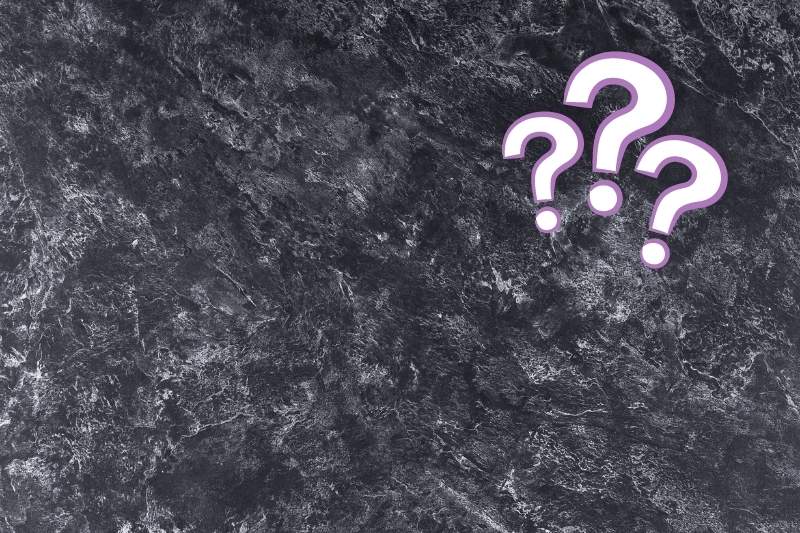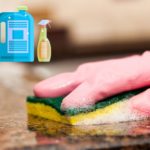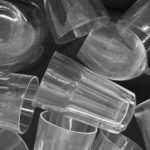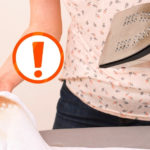White marks on countertops can be caused by a variety of different things including soap residue and food stains.
However, if you’re struggling to remove them with just soap and water, the white marks on your worktops are likely hard water stains.
If your countertops have fallen victim to this tough residue, look no further. In this post, we’ll take you through several ways to get rid of white marks on worktops.
What Causes White Marks on Worktops?
If you live in a hard water area, namely London or the South East of England, the water that comes out of your taps will be slightly cloudy.
You’ll also find more limescale around your sinks and faucets, as well as in your kettle and bathtub, compared to soft water areas.
This is due to high levels of calcium and magnesium in the water.
While this isn’t dangerous in any way, hard water that isn’t wiped up will inevitably leave white, chalky marks on your surfaces. This is because of the mineral deposits left behind when the liquid evaporates.
The simplest way to prevent a build-up of water marks is to clean up any spillages straight away and dry your worktops thoroughly after use. However, if you forget or miss a spot, you can try the methods below to remove the stains.
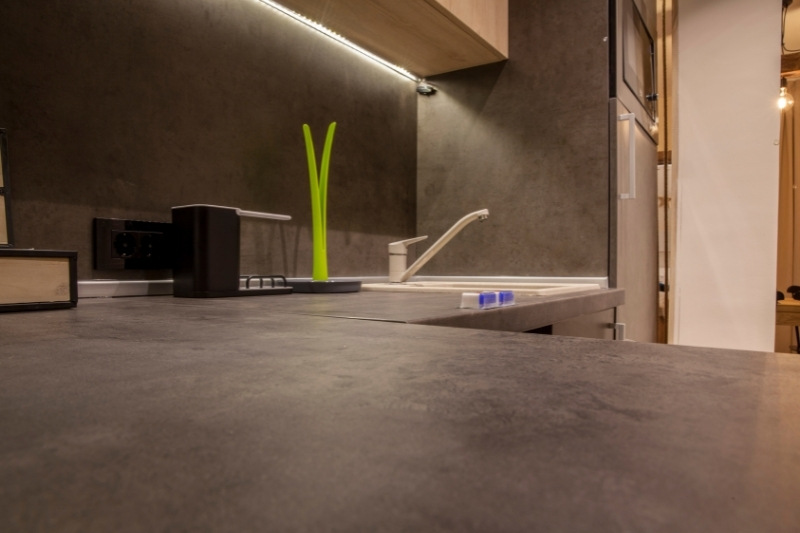
How to Get White Marks Off Laminate Countertops
When cleaning laminate, it’s important to avoid anything too abrasive that could damage the surface. With that in mind, you’ll want to avoid Brillo pads and steel wool in favour of soft sponges or microfibre cloths.
You’ll also want to avoid harsh chemicals and opt for a mild cleaner instead.
The first method for removing white marks is a dash of white vinegar on a damp cloth. This natural, all-purpose cleaner is highly effective at removing all kinds of dirt and marks.
However, if the water mark has solidified into crystals and you need something stronger, try applying fresh lemon juice to the water mark and leave it to sit for around half an hour.
Next, sprinkle some bicarbonate of soda (baking soda) on top and let it soak in. You can then gently rub the paste into the area with a damp cloth to lift the stain.
Finally, using the clean side of the cloth, wipe away the excess mix, rinse and then dry the surface with a clean tea towel or kitchen roll.
How to Remove Hard Water Stains from Stone Worktops
Granite/ marble
While vinegar and lemon juice are ideal for cleaning laminate countertops, they should not be used on natural stone.
This is because granite and marble are naturally porous so they are treated with a sealant for use in kitchens, and this will be stripped by acidic substances.
Instead, you can treat white m0..arks on granite countertops with a natural stone cleaner like Method Granite and Marble Cleaner, or make a paste with bicarbonate of soda and water.
Again, you should gently rub the mix into the worktop rather than scrubbing to avoid damaging the surface, then use a clean cloth to wipe off the mix.
Next, rinse and dry the surface to prevent another build-up of residue that will dull your worktops.
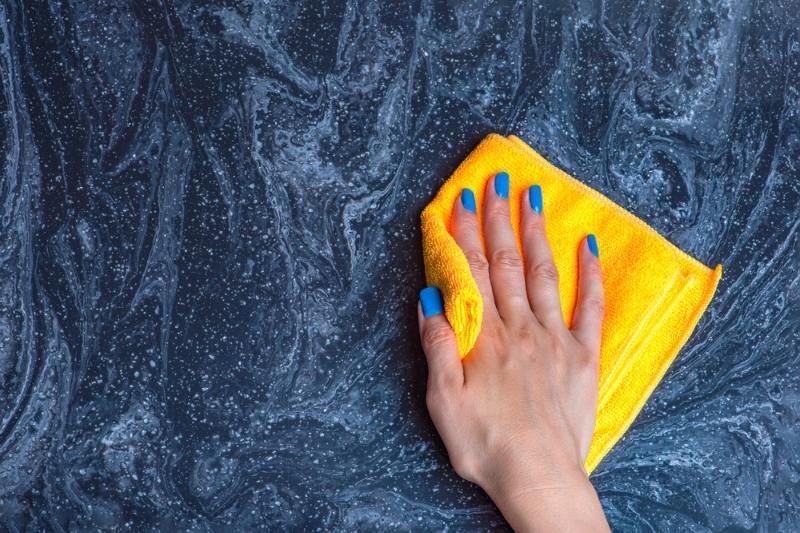
Quartz
Unlike natural granite and marble worktops, their quartz equivalents are constructed from a combination of ground quartz and resin.
As a result, they aren’t porous like natural stone countertops and they’re also much harder.
Because of this, slightly more abrasive methods are unlikely to damage quartz worktops.
So, if you’ve tried the methods above and none of them have worked, you can gently use a steel wool pad to loosen the hard water particles and then wipe up the debris with a damp cloth.
Other Causes of White Marks on Worktops
Food stains
White foods such as yoghurt and milk can also leave visible marks on your worktops, so make sure you clean your surfaces down thoroughly if you spill any.
A mix of soap and water should work, just remember to rinse and dry the surface afterwards.
Tip: where possible, use distilled water for rinsing surfaces as it won’t leave any residue.
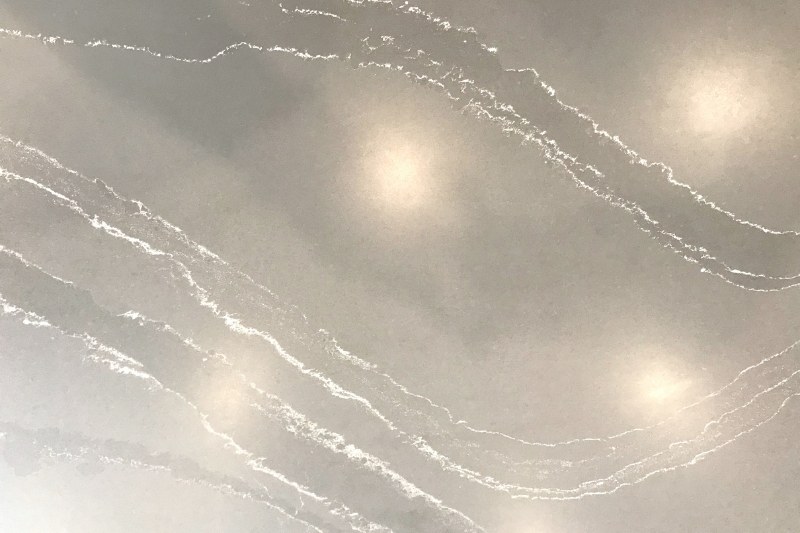
Soap residue
While soap scum occurs in every kitchen, if you have hard water, the leftover residue will be much more obvious. This is because the magnesium in the water reacts with the soap and creates a solid material that doesn’t dissolve.
You should therefore rinse down any surfaces that come into contact with soapy mixtures and fully dry them to avoid a build-up.
Chemical stains
Be careful if using harsh chemicals like bleach near your worktops, as any spillages could cause burn marks, discolouration or fading.
The white marks left behind in these cases are notoriously difficult to fix and you’ll likely need to invest in a stain marker or laminate repair paste/ putty to conceal the damage.
To avoid this, clean up any spillages right away and rinse the countertop well before drying the surface with some kitchen roll.
Keen to explore more handy DIY cleaning hacks? Explore our blog to discover everything from how to clean wooden worktops to the benefits of lemon juice vs. vinegar for cleaning and the best water softeners for your home, plus so much more!

A proud Yorkshire lass with a love for movies, music and cosy nights in! Once a self-confessed avoider of cleaning, she’s always on the lookout for new ways to make household chores as quick and simple as possible.
